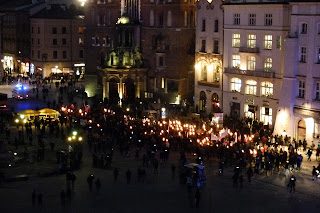Friday, 8 March 2013
There's remembering, and there's trying to understand...
Visiting Krakow has given me a lot to think about, so there may well be two or three posts that emerge from all that painful effort at something that might pass for thought.
This post emerges from:
A well-known photo. Perhaps too well-known; perhaps familiarity doesn't help us as we try to understand, to internalise and come to some acceptance of what happened. We have to accept that it happened. We should, perhaps, never come to terms with it.
I've a problem with the term "Holocaust." It seems to me too easy a shorthand, and gives rise to "Holocaust deniers." That isn't a position we should even acknowledge, it's just non-sense. The Nazi genocide (see? less easy to say...) is undeniable unless you are a deeply malevolent person, or disturbingly disconnected with what the rest of us call the world.
We are often urged not to forget. I'm puzzled as to how anyone could forget - though I'm all for Holocaust Day etc, so the collective memory and the individual understanding is enriched, and the dead are honoured. We should do more of that for our own families, let alone for huge numbers of people.
Remembering the Nazi genocide is far too easy. The familiar conundrums emerge: what would I have done? The horribly familiar photos and descriptions pop back up in the memory, and the sun clouds over for a while. It can be, perhaps should be, bewildering- and intensely depressing.
Until we remember Schindler, and all the other impossibly brave people who did what they could, however small an action it was. I helped with the funeral of a woman born in Germany who lived near Berlin during the war; her parents were Communists, they listened in secret to the BBC. On her way to her Land Girl-type job, she passed the work place of Russian prisoners of war. As "untermenschen," Russian soldiers, like Poles, were treated very badly indeed. She used to smuggle food (of which she had little enough) out of her house and hide it as she passed in the log piles they were working on. A small action, that reverberates wonderfully.
Remebering Schindlers of all scopes of action brings the sun out again. Even there, in the depths of cruelty and fear, in that place, ordinary people did such things because they simply had to, even though in terms of their own survival (you know: the selfish gene, the survival of the fittest etc) it was a very bad idea. The Problem of Goodness - why do some people do dangerously unselfish things, out of the blue? It's a problem for our reasoning faculties, I'm pleased to say.
I don't know that it's possible ever to finally understand the Nazi genocide. How could a civilized nation...etc etc. Auschwitz and all the other such places are surely one utter extreme of human history on the planet. I can't, in one sense, understand it. I can't even go near it, yet I can't leave it alone. And that's because I do think it is important to try to develop our understanding of it.
Reason only gets us so far - it was, in terms of resources and manpower, a mad policy even from the point of view of the German war effort, and the depths of it are perhaps beyond any accommodation our imaginations can reach.
Here are some people who don't seem to have understood anything useful about it.
Sorry it's such a lousy photo. It's a shot from our hotel balcony in Krakow of a demo by the extreme right. They were chanting angry-sounding stuff, but it all looked quite pretty from a few stories up, blue lights on police vans, flaming torches and all.
Flaming torches? Well, now. The first Olympic flaming torches were at the Berlin Olympics of 1936. The Nazis rather liked flaming torches. Something heroic and ancient about them, something uncompromising and privileged (we bring the fire and the light into your darkness....flaming torches came in handy on Kristallnacht.)
Sure enough, when we asked a taxi driver about this, he said the extreme right were blaming immigrants for the country's problems, and also, of course - the Jews.
Well, of course. They are such powerful people, you see. About twenty thousand Jews living in Poland today. Two thousand in Warsaw, two hundred in Krakow. Poland has a population of 36 million. FFS.
I don't expect these people to hang their heads in shame, or to try to understand the history of their country and of Europe in the 20th century. Either of those things would put out their torches. If you are poorly educated and badly paid or unemployed, if you've had a lousy upbringing, it might seem like fun to march about with flaming torches blaming a tiny minority for economic difficulties which are actually on the macro scale of things.
Except that there are poorly educated badly paid people who have had a lousy early life who do not vandalise cemeteries or look for convenient scapegoats. Happily, the Problem of Good arises once again. The extreme right in Poland is at present, very small. Nevertheless, as one graffiti artist summed it up so neatly in Krakow recently:
Where, I asked the taxi driver, were the rival demos, where were the students? He said (and he is a student) "They only demonstrate about money."
Subscribe to:
Post Comments (Atom)




No comments:
Post a Comment